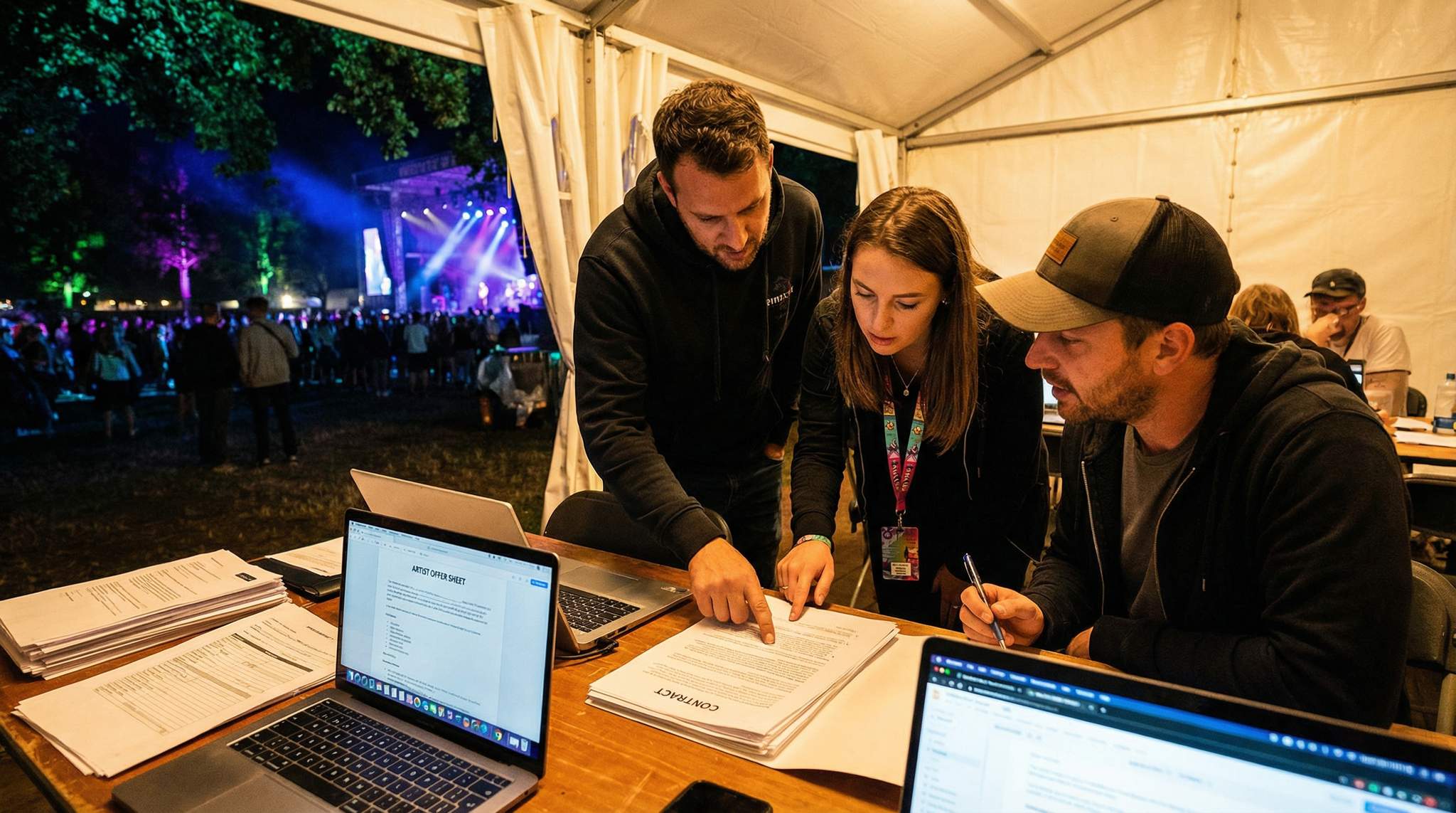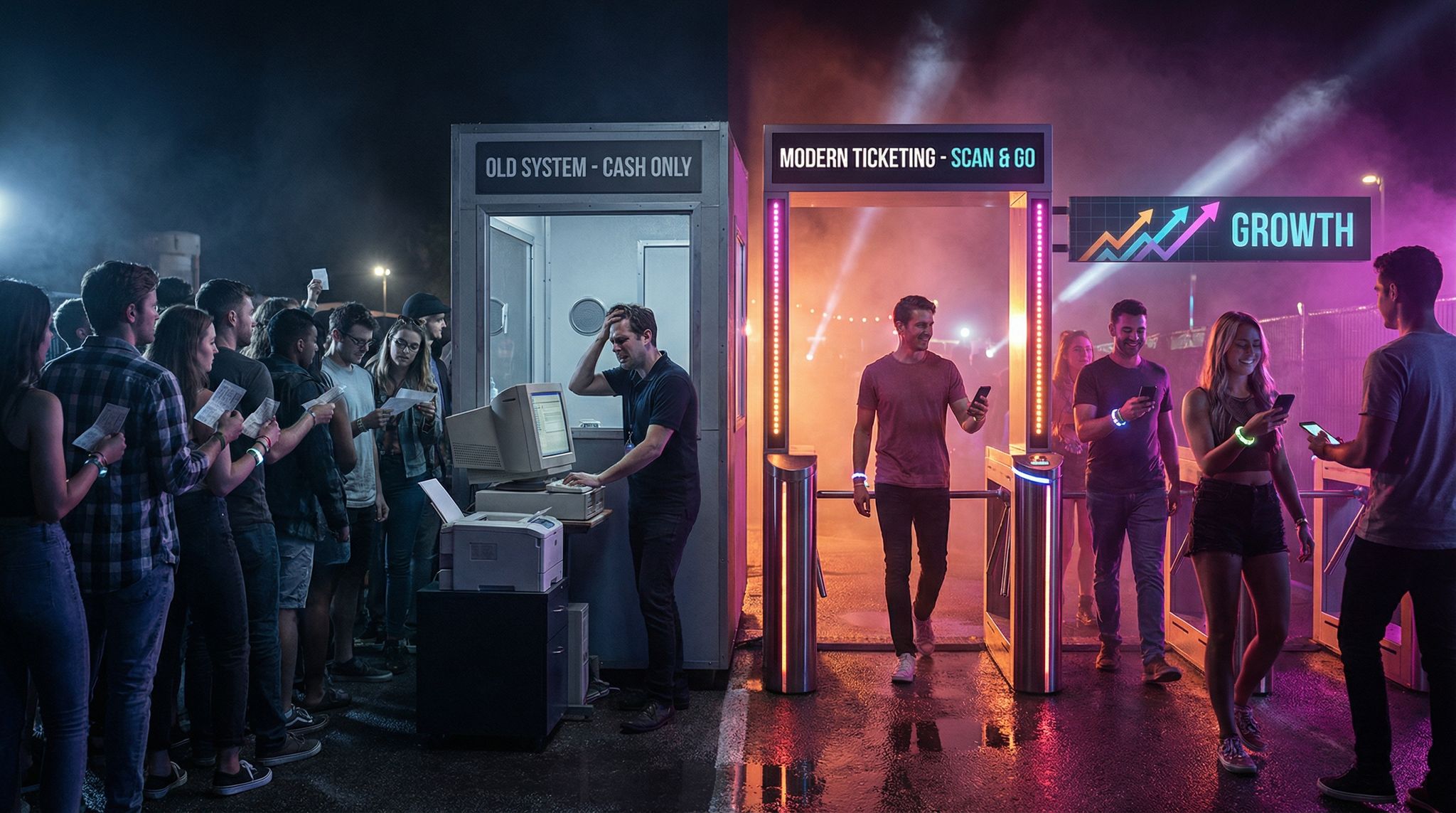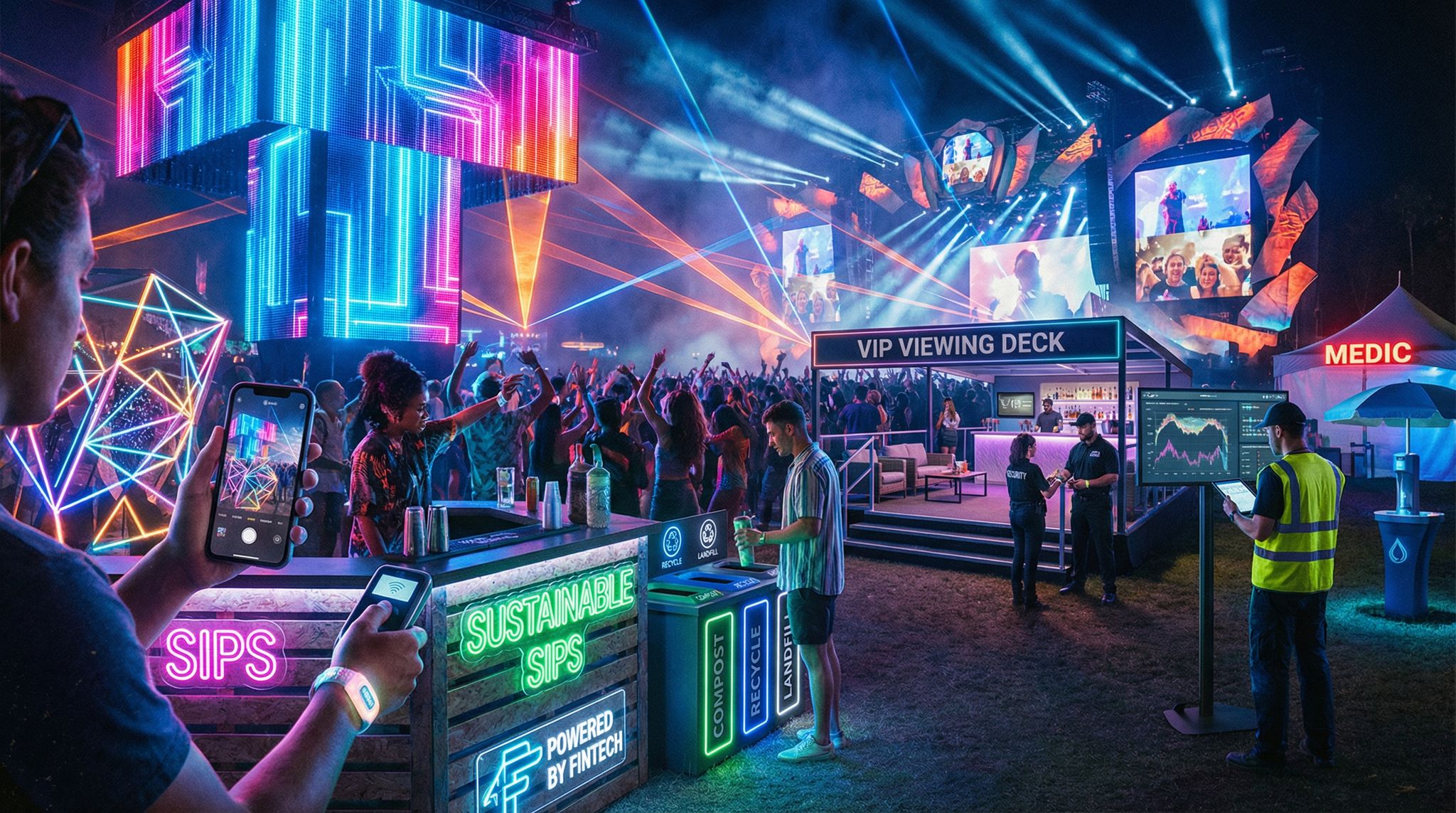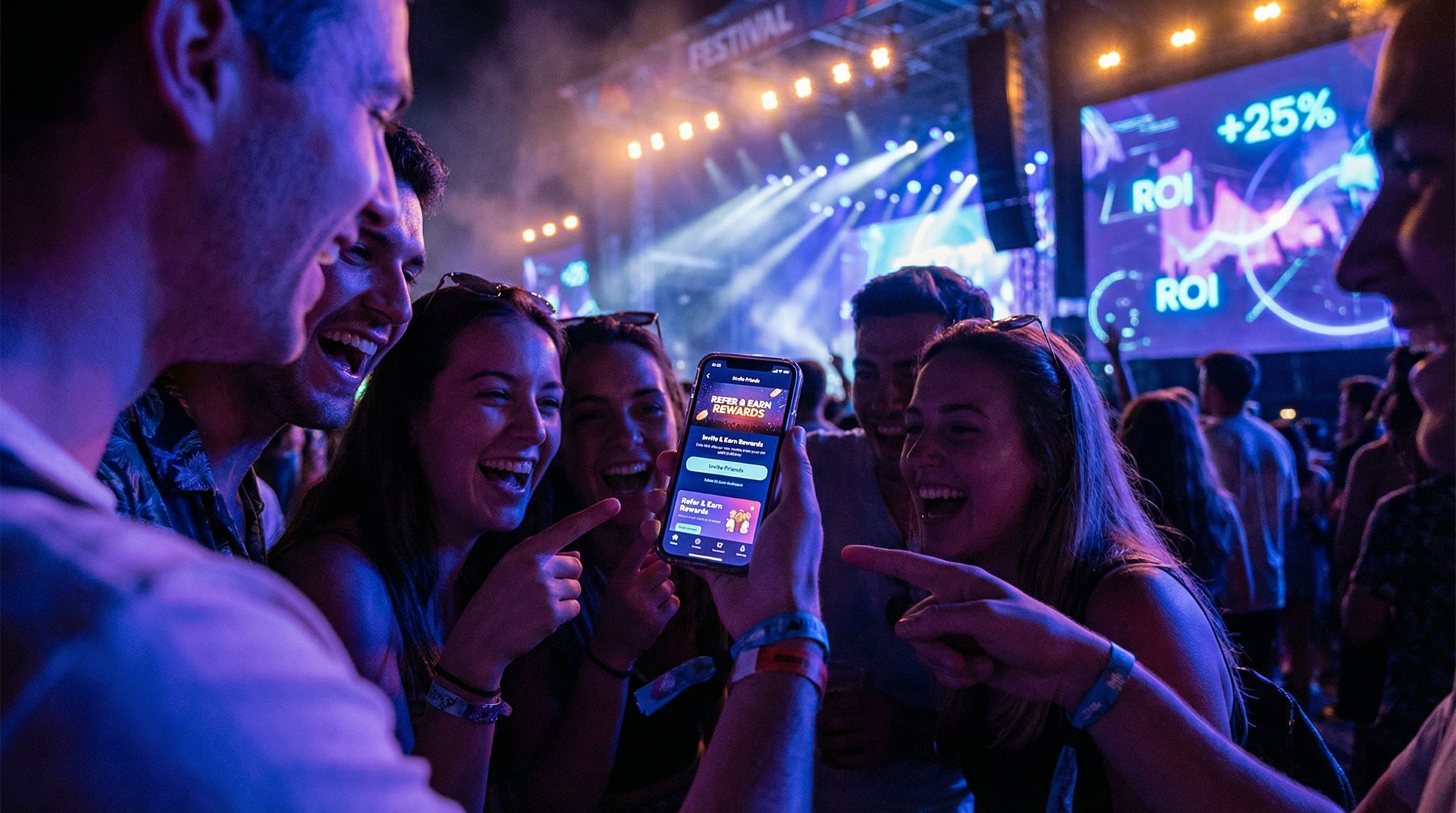Negotiating Artist Fees and Contracts for Festivals: A Deep Dive
Organizing a festival lineup involves more than just picking great talent – it’s also about negotiating fair artist fees and solid contracts. This stage can make or break a festival’s budget and reputation. Drawing on decades of festival production experience, this guide breaks down practical strategies to negotiate performance fees within budget, sweeten deals with creative incentives, and lock in contracts that protect your event. Whether working on an intimate local fest or a massive international festival, the principles of respectful and savvy negotiation hold true. This deep dive offers actionable advice and hard-earned wisdom for promoters at every level.
Preparing to Negotiate: Know Your Budget and Value
Before reaching out to any artist or agent, ground your negotiation in solid research and budgeting:
- Set a Realistic Talent Budget: Calculate how much of your festival budget can go to artist fees. Factor in all artists (headliners, mid-tier, locals) and remember to leave a buffer for production and unexpected costs.
- Research Market Rates: Understand what fees artists of similar caliber typically command. For example, headliners at a major festival might charge six or seven figures, while emerging local acts might perform for modest fees or even just expenses. Industry publications and past festival lineups can give clues to fee ranges.
- Know Your Festival’s Value Proposition: Be ready to articulate why performing at your festival benefits the artist. A large established festival can offer exposure to tens of thousands of fans and prestige. A smaller boutique festival might offer a more intimate setting, dedicated fanbase, or alignment with a cause or genre the artist cares about. This value can sometimes justify a lower fee if the experience or exposure is unique.
Example: A regional indie festival once courted a rising band whose standard fee was beyond reach. The organizers emphasized the festival’s strong media coverage and the band’s prime sunset slot before the headliner. By also offering to cover all travel and lodging, the festival convinced the band to accept a fee within budget. The key was showing the band the gig’s overall value, not just the paycheck.
The Art of Negotiation: Beyond the Base Fee
When it comes time to negotiate, be prepared, professional, and creative:
Turn Fans Into Your Marketing Team
Ticket Fairy's built-in referral rewards system incentivizes attendees to share your event, delivering 15-25% sales boosts and 30x ROI vs paid ads.
- Start with a Respectful Offer: Open with a fee offer that’s within your budget but still earnest. Agents expect some back-and-forth; starting too low can offend, but opening at your maximum leaves no room to maneuver. For instance, if you can spend up to $10,000 for an act whose going rate is $12,000, you might offer around $8,000 initially, with plans to negotiate upward through incentives.
- Offer Smart Incentives: Money isn’t the only bargaining chip. Festivals often sweeten deals by covering or upgrading travel, accommodation, and hospitality. You might offer first-class flights or extra hotel nights for the artist’s team. Providing ground transportation, meal buyouts, or a personal hospitality runner on show day can add appeal. Another incentive is billing and scheduling – for example, giving the artist a higher spot on the lineup or a better time slot can be as valuable as cash, especially to mid-level artists looking for exposure.
- Know Your Leverage and When to Compromise: Recognize how much bargaining power you have and identify what’s flexible in your offer. An artist with lots of lucrative options may be less inclined to budge on price, whereas a rising act eager for exposure could be more amenable to creative terms. If an artist’s fee is slightly above your budget, can you trim costs elsewhere or find a sponsor for that act? Conversely, know your limits – if their demands would jeopardize your festival’s finances, be ready to politely walk away. It’s better to lose one artist than to overspend and hurt the entire event.
- Maintain Good Relationships: Throughout negotiations, be honest and respectful. If you’re a small festival, it’s okay to explain your budget constraints and highlight non-monetary perks. Agents appreciate clarity. A positive negotiation experience can lay the groundwork for future bookings – today’s “no” might turn into a “yes” next year if you leave a good impression.
Example: At a boutique electronic music festival, a sought-after DJ initially declined due to a low fee. The promoter went back with a package: slightly increased pay, a VIP festival experience for the DJ’s family, and a promise of a headline slot at a sister event. Impressed by the effort to meet his needs, the DJ accepted. This demonstrated that creative deal-making, not just money, can close a deal.
Crafting the Offer Sheet: Details Matter
Once verbal terms are tentatively agreed, it’s time to send a formal offer sheet (or offer email) to the artist’s agent. This document outlines all key details of the booking so everyone is on the same page. A comprehensive offer sheet typically includes:
Planning a Festival?
Ticket Fairy's festival ticketing platform handles multi-day passes, RFID wristbands, and complex festival operations.
- Performance Date & Time: The exact date of the show and the set time or slot (e.g., “Saturday, June 12, 9:00–10:00 PM on Main Stage”). If your festival spans multiple days or stages, clarify when and where the artist is expected to perform.
- Set Length: How long the performance will be (e.g., a 45-minute set with one encore, or two 30-minute sets, etc.). Make sure this aligns with what was discussed; artists plan their sets and stamina accordingly.
- Compensation: The fee being offered, clearly stated in the agreed currency and any payment structure (for example, “$5,000 USD total, inclusive of all expenses” or “$5,000 plus airfare and hotel”). If the fee is “plus expenses,” specify exactly which expenses are covered – such as flights, ground transport, hotels, per diems, and hospitality.
- Travel & Accommodation: Outline what travel arrangements will be provided or reimbursed. This can include number of flights (e.g., “4 round-trip economy flights” or “2 business class flights”), ground transportation to and from the venue, and hotel rooms/nights (e.g., “3 hotel rooms for 2 nights at a 4-star hotel”). If you have a travel agency or specific hotels you partner with, mention that for transparency.
- Hospitality & Rider Provisions: Summarize the hospitality that will be provided. This might be a general statement like “hospitality per rider to be provided, including catering for 8 people” or specifics such as meal buyouts, backstage refreshments, and whether you provide a green room or private dressing area. You can note if there’s a hospitality budget cap as well.
- Technical Support & Equipment: Clearly state what production elements you will supply. For example, “festival to provide full sound system, lighting, and standard backline (drum kit, guitar amps, etc.) as per attached technical rider.” If the artist requires specialized equipment (giant video walls, special instruments), clarify whether the festival will supply it or if the artist must bring their own. Address soundcheck or line-check times if applicable.
- Billing and Promotion: Include the agreed billing (e.g., “Second line headliner” or “Special guest”) and any promotion commitments. Major acts sometimes negotiate how they will be billed on posters (font size, order) or require approval of their images in marketing. It’s good to note if the artist is expected to participate in festival promotions, like social media shoutouts (if that was part of the deal).
- Other Key Terms: This can include things like the artist’s guest list allowance (e.g., “10 guest passes will be provided”), merchandising rights (e.g., whether the artist can sell merch on-site and if any revenue split applies), and exclusivity/radius clauses if discussed (e.g., “Artist agrees not to perform another concert within 100 miles for 30 days before the festival”).
All these elements should reflect what was negotiated verbally or over email. The offer sheet is essentially a pre-contract summary. It ensures everyone agrees on the core terms before moving to the formal contract stage.
Wisdom Tip: Any written offer can be considered legally binding once accepted. In the festival world, there’s a saying: “Don’t put it in writing unless you’re prepared to honor it.” When you send an offer sheet, assume the artist will say yes. This means you must be prepared to pay the agreed deposit (often 50%) immediately upon the offer’s acceptance and follow through on every promise. Never send out a written offer for more money or perks than you can actually deliver, thinking you can adjust later – if the artist accepts, you’re on the hook.
From Offer to Contract: Navigating Legal Clauses
If the artist (or their agent) accepts your offer, the next step is signing a formal performance contract. Often, the artist’s agency will send their contract template, which can be quite detailed. It’s crucial to review every clause carefully – ideally with an experienced entertainment lawyer – to ensure you’re not agreeing to unrealistic or risky terms. Here are some common contract clauses and considerations:
- Payment Terms: Contracts usually reiterate the fee and schedule (e.g., 50% deposit on signing, 50% by show day). Make sure the timing aligns with your cash flow. Also note the form of payment required (wire transfer, cashier’s check, etc.) and any consequences for late payment.
- Cancellation and Force Majeure: Look for clauses about what happens if the festival or artist cancels. Agents often include a cancellation clause allowing an artist to cancel without penalty a certain number of days before the event (though they typically return any deposit). Try to negotiate reasonable notice – for instance, 90 days instead of 30, to give you time to find a replacement. Also, be aware of force majeure or “weather clauses.” These might state that if the artist is ready to perform but the show gets canceled due to weather or other uncontrollable events, the artist still receives full payment. Ensure your event insurance can cover this scenario, or negotiate the clause (e.g., only half-fee if the set is canceled due to weather before a certain point).
- Exclusivity (Radius Clause): Many festival contracts include a radius clause preventing the artist from playing another show within a certain distance and time frame of your festival. This protects your ticket sales by making the performance unique in your region. Ensure the radius and dates are reasonable – too large or too long and it could deter the artist (especially if they’re on tour). For example, a 90-day, 150-mile radius might be standard for a mid-tier festival headliner.
- Technical and Hospitality Riders: The contract will often incorporate the artist’s technical rider (equipment and production needs) and hospitality rider (backstage food, drinks, comfort). These can be extensive. Review them with your production team. If the rider demands something unrealistic – say, extremely costly audio gear, or a luxury item far outside your budget – now is the time to negotiate it out or find a compromise. Sometimes a hospitality buyout (paying a bit extra so the artist can arrange something themselves) can solve a difficult request.
- Standard of Care and Safety: High-profile artists may have clauses about security, safe working conditions, or specific on-site requirements (like private bathrooms, secure compounds, etc.). Make sure you can meet these or negotiate changes. Artist safety and comfort are important, but the terms should be feasible for your event.
- Marketing and Recording Rights: Check clauses about how you can use the artist’s name and likeness in marketing. Agencies often have strict rules – for example, you might be barred from using an artist’s image to promote sponsors without permission. If you plan to record or live-stream the performance, ensure the contract grants you that right; otherwise, filming might be prohibited or require an additional release.
- Insurance and Liability: Many contracts require the promoter to carry liability insurance (with the artist named as additional insured) and to indemnify the artist from lawsuits arising from the event. This is standard, but verify you have the proper insurance coverages in place. If an artist’s contract asks for exceptionally high coverage limits or other unusual liability terms, get legal advice on how to handle it.
- Unrealistic Demands: Sometimes, boilerplate contracts from agencies contain clauses that just don’t fit your festival. For example, a contract might demand a brand new grand piano for a pop act that doesn’t actually play piano – likely a leftover from another rider. Or an artist might request 100 complimentary tickets, which could be a quarter of your small festival’s capacity. Don’t assume you must accept every clause as-is. Seasoned festival producers review each line and negotiate changes. It could be as simple as crossing out a clause, or as formal as writing an addendum, but everything is negotiable before signing.
Wisdom Tip: Always have a legal or experienced eye review the contract before you sign. It could be a dedicated entertainment lawyer or a veteran talent buyer within your team. They’ll spot hidden liabilities or overly burdensome requirements that a new promoter might miss. For instance, one festival organizer discovered an artist’s contract required first-class airfare for 6 people – something not discussed in the offer. They negotiated it down to economy-plus, saving thousands. That catch was only possible because they scrutinized the contract line by line.
Finalizing the Deal: Professionalism and Follow-Through
After negotiations and contract revisions, you’ll reach a point where both parties sign on the dotted line. But your work isn’t over yet – true professionalism is shown in the follow-through:
- Timely Deposits and Payments: Pay the deposit as soon as the contract is signed (or by the deadline in the contract). Delays in payment can erode trust and even jeopardize the booking. Likewise, prepare the final payment well in advance of the festival date.
- Honor All Agreed Terms: Ensure your team is fully aware of every promise made – from big (flight tickets, hotel quality) to small (brand of beverages in the dressing room). Create an internal checklist for each artist’s requirements so nothing is overlooked. Failing to meet an obligation, however minor, can sour the artist’s experience and your reputation.
- Communication is Key: Keep open lines of communication with the artist’s representative as the event approaches. Confirm logistics like itineraries, on-site contacts, and schedules. This not only reassures them that you have everything handled, but also builds a positive working relationship. Artists and agents remember organizers who communicate well.
- Learn for Next Time: Each negotiation is a learning opportunity. After the festival, debrief with your team about what went well in your artist negotiations and what could improve. Maybe you discovered that offering slightly more on hospitality saved money on fees, or perhaps you learned some agents appreciate shorter contracts to cut down legal wrangling. Build on these lessons for future events.
Conclusion: Wise Negotiation Builds Great Festivals
Negotiating artist fees and contracts is a craft that improves with each festival produced. Veterans of the industry understand that successful negotiations aren’t about “winning” a deal, but building a partnership between festival and artist. By being prepared, transparent, and creative, even a new promoter can create win-win agreements where artists feel valued and events stay on budget.
Need Festival Funding?
Get the capital you need to book headliners, secure venues, and scale your festival production.
Every festival – from a 500-person local gathering to a 100,000-strong international extravaganza – hinges on the strength of its lineup and the deals behind it. Approach negotiations as a collaborative effort. Respect the artist’s needs and the agent’s role, but also stand firm on what your event requires. Over time, you’ll develop a reputation as a festival organizer who is fair, reliable, and great to work with. That reputation, above all, is what attracts top talent year after year.
In the end, negotiating artist fees and contracts is about balancing dreams with realities – bringing amazing performances to your stage without compromising your festival’s viability. With the right approach, you can close deals that delight your audience, satisfy your artists, and set your festival up for long-term success.
Frequently Asked Questions
How can festival organizers negotiate lower artist fees?
Organizers can negotiate lower fees by emphasizing the festival’s value proposition, such as exposure to large audiences or a unique intimate setting. Offering creative non-monetary incentives is also effective, including upgraded travel and accommodation, prime billing spots, better time slots, or covering specific expenses like meal buyouts and ground transportation.
What details should be included in an artist offer sheet?
A formal offer sheet must outline the performance date, set time, and length, along with the specific compensation structure. It should clearly detail covered expenses like flights and hotels, hospitality provisions, technical support, billing requirements, and any exclusivity clauses. This document acts as a binding pre-contract summary of agreed terms.
What is a radius clause in a music festival contract?
A radius clause is a contract term that prevents an artist from performing other concerts within a specific distance and time frame of the festival. This exclusivity protects the event’s ticket sales by ensuring the performance remains unique in the region. A standard example might be a 90-day, 150-mile restriction.
How do force majeure clauses affect festival artist payments?
Force majeure clauses dictate payment terms if a performance is canceled due to uncontrollable events like severe weather. These clauses often require full payment to the artist if they are ready to perform but the show is canceled. Organizers should negotiate these terms or ensure their event insurance covers these specific liabilities.
Why is it important to review artist technical and hospitality riders?
Reviewing riders is critical because they often contain expensive or unrealistic demands, such as specific luxury items or high-end audio gear. Scrutinizing these documents allows organizers to negotiate changes, such as hospitality buyouts or equipment compromises, before signing the contract. This prevents unexpected costs and ensures all requirements fit the festival’s budget.
When does a festival offer become legally binding?
A written offer sheet can be considered legally binding once the artist or agent accepts it. Festival organizers must be prepared to honor all terms immediately upon acceptance, including paying the deposit, which is often 50% of the fee. It is crucial never to put terms in writing unless the budget allows for them.





